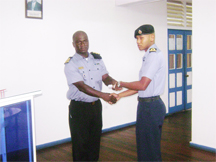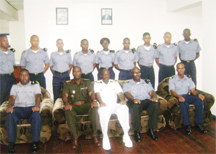…must also assist in removing corrupt elements
Eleven officers who successfully completed the Coast Guard Young Officers Course #1 were yesterday urged by Chief of Staff, Commodore Gary Best to display leadership qualities and to assist in the removal of any corrupt elements within the unit

He made specific reference to an officer who was among three recently arrested at Parika by the police.
Commodore Best during the simple graduation ceremony held at the Coast Guard Headquarters, Ruimveldt, pointed out that such elements need to be pointed out and the new officers must set themselves apart from that group and not be contaminated by the actions and attitudes of those before the court and those who will soon be before the court.
He told the young officers who included one female that thinking of wealth will do no good for them or the unit and they would eventually be caught if they engaged in nefarious activities. He urged them to support their seniors and commanders to help stamp out corruption.
“You have an important opportunity now to change the image of this unit… There is no shortage of officers but a shortage of leadership at all levels”. Commodore Best stressed that it all comes back to how well they could lead and how committed they are to leadership. He impressed upon them the need to be firm in their leadership.
Pointing out that there is a lot of work that needs to be done, he noted that it is up to the officers to do it as they are the leaders of the Unit. He noted that things have happened in the last few months but the new officers must not be caught up in that adversity but should rather find the strength to overcome them. He said that in order to become good leaders, the officers must display professionalism.

In referring to the recent case at Parika he said one officer and two others are currently in a cell at Camp Ayanganna. He said that the officer abandoned his location in pursuit of wealth along with the other two, putting the army in negative light in the media once again.
The gathering was told that their colleagues will remain there until they have been court martialled or a civil case is brought against them. He told the young officers that he has confidence in the unit but the bad elements needed to be removed.
He announced that an officer from the course had suddenly disappeared and another from the group is knowledgeable of his whereabouts but is providing protection.
While not going into details, he urged them to take an example from the good within the Unit and follow their lead.
The young officers successfully completed this part of the course with a pass mark of 60% and over in August and will started the second phase; a practical exercise aboard the Guyana Defence Force flagship Essequibo around February next year.
In giving an overview of the course, the Principal Instructor, Lieutenant Marlon Chichester said that its objective was to enable the officers to be craft commanders aboard any coast guard vessel and to competently perform the duties of District officer for the various coast guard locations.
With the completion of the modules he said that the young officers would be able to discuss and apply the customs and traditions related to the coast guard.
Upon completion of the module he said the young officer must be fully competent to function as a deck officer aboard any vessel. The young officers will also be able to explain the concepts of International Maritime Law and discuss how it applied to the tasks and functions of the GDF Coast Guard; will be able to manage the bridge and navigation team with chart work and passage planning in accordance with the manual.
The young officers will also be able to explain the principles of operating the radar, sonar, radio, GPS, GMDSS and other electronic bridge equipment and discuss how they are incorporated into the Maritime environment, Lieutenant Chichester said.
To gain entry into the course, the officers must have successfully completed the standard officers’ course. Coast guard history and customs; seamanship; fire-fighting and damage control; international maritime law; outboard boat handing and swimming and survival techniques were some of the topics focused on.
It was recommended by Lieutenant Chichester that the course be extended by at least six weeks to allow more time for practical exercises, something Commodore Best said will be considered.
Midshipman Wayne Richmond is the best graduating student. He also secured the best navigation rules knowledge prize.




